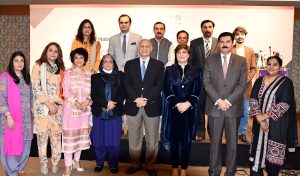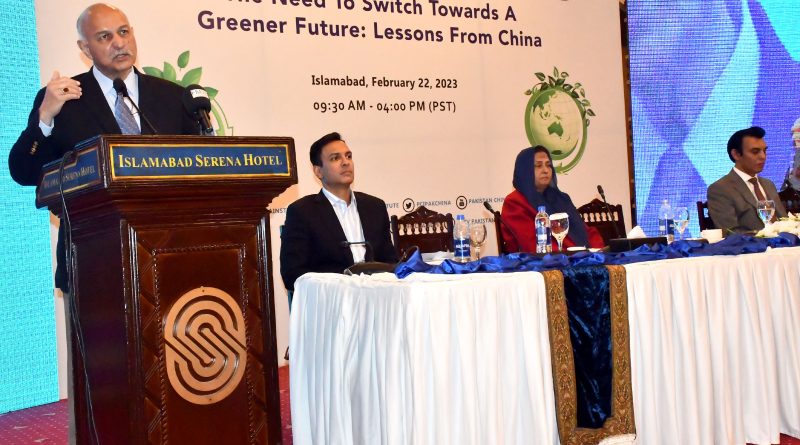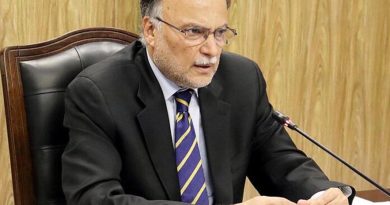China inspired renewable policy model can unlock investment potential in Pakistan: Experts
ISLAMABAD: The experts at a conference on Wednesday were of the view that China had emerged as a global leader in renewable energy and green development, and thus its renewable policy model could open up vistas of investment in renewable in Pakistan.
The conference titled, ‘The need to switch towards a greener future: Lessons from China’, was jointly organized by Pakistan China Institute (PCI) and Sustainable Development Policy Institute (SDPI) here, a news release said.

Addressing the conference, Chairman Senate Committee on Defence, Senator Mushahid Hussain Syed said, ‘Green is a defining element of China’s development agenda and President Xi Jinping on the occasion of COP in 2015, while pledging carbon neutrality, had made the commitment that China would emerge as a leader in green development. Today China is leading the world as a producer and investor in green technology and finance.
The shift to green technology has created additional 54 million jobs so far, which shows the immense multifaceted potential of green development.” He was of the view that China was officially at par or has taken lead from USA in green technologies, AI, STEM, etc. Senator Rukhsana Zuberi stressed on conducting energy audits to identify wasteful practices and increase energy efficiency. She said that after the first energy audit of the building of the Pakistan Energy Council, 35% reduction in energy consumption was achieved.
She stressed the need for advocacy and engaging with common people to increase energy efficiency at the household level by highlighting the financial cost that can be saved by making small consumption changes. Executive Director, SDPI, Dr Abid Qaiyum Suleri said, “We must recall success stories from China in tackling environmental and climate issues.” He further said that China successfully reduced Smog and particulate-matter air pollution by 60% in a short span in Beijing. He maintained that China’s great Green Wall in 2013-14 was another initiative, which effectively managed desertification.
China offers a leadership model from micro to meso-level in managing resources efficiently, and addressing the growing threats of environment and climate change, which Pakistan must take inspiration from, he said. He added that CPEC was not limited to trade or energy rather agriculture and food security were essential component of green CPEC and the use of nature for greening was visible in various CPEC initiatives, including China’s assistance to Pakistan in the form of genetically engineered seeds and rice.
Dr Zhao Baige, Vice Chair of the 12th NPC Foreign Affairs Committee, Chair of Advisory Committee of RDI recalled that China announced in 2016 its policy for carbon neutrality and has been committed to achieving the policy guidelines, which was the reason behind China emerging as a global leader in renewables and emission reduction. She stressed that Pakistan had immense potential for green development by promoting renewable energy.
She said that Chinese enterprises are interested in investing in green development projects in Pakistan and much can be achieved with commitment, cooperation and right policies. Dr Sajid Amin Javed, Deputy Executive Director, SDPI said that green financing in Pakistan is still a residual policy and not a mainstream economic policy. First and foremost, it must be made a main economic and financing policy, he said, adding that climate change is a macro-economic risk and no longer an environmental risk, which is evident from recent floods.
Dr Hassan Daud, Senior Advisor, SDPI said that Pakistan was the first to receive cash flow from China under BRIs energy projects aimed at the wind and solar energy generation. “Despite being the first, we have not explored the true potential of the sector so far,” he said and emphasized that every penny spent on renewable energy technology guarantees long-term energy and economic security for the country.
Hamza Orakzai, Director Strategic Planning and Regulatory Affairs, Special Technology Zones Authority (STZA), informed that for the first time, new laws for investors in SEZs had been introduced in Pakistan to simplify the legal and regulatory environment which would build a strong business case for attracting investments.
Mustafa Hyder Sayed, the Executive Director, Pakistan China Institute, in his concluding remarks, stressed on establishing Special Economic Zone (SEZs) at strategic location to explore their true potential as simply mushrooming them is not enough. He said that Shenzhen emerged as the most successful model of SEZs is due to its strategic location in proximity to other business clusters. APP



